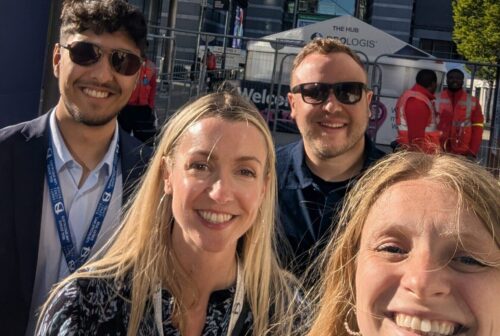UKREiiF – the next generation

I was fortunate to attend UKREiiF 2025, which offered a fascinating window to the future of our built environment.
Amongst the countless discussions on innovation and investment, what intrigued me the most were the panels discussing the often-limited engagement of young people in shaping the very communities they will inherit. This absence becomes particularly significant when considering the tensions that can arise between the older demographic and the need for new development.
The community engagement panels I attended effectively highlighted the imbalance in who participates in development discussions, which tend to be dominated by older generations. While their experience and local knowledge are undeniably valuable, this lack of diverse representation can unintentionally reinforce resistance to change—often driven by a desire to preserve the familiar or by ‘NIMBYism’.
This dynamic often creates a significant challenge for bringing forward necessary development, which would help local councils address their housing shortfalls. The concerns voiced at public consultation events can become heavily weighted towards the perspectives of long-established residents more resistant to change, sometimes overshadowing the urgent needs and aspirations of younger individuals struggling to climb that first rung of the housing ladder within the area they call home. This can lead to long-drawn-out planning processes, land not being used to its full potential, or outright refusal of planning permissions, ultimately perpetuating the housing crisis for future generations.
This is where the meaningful engagement of young people becomes not just desirable, but essential for balancing the scales. With the active involvement of younger residents in the public consultation process, we can:
- Provide a fairer narrative on development – younger people bring an alternative set of priorities and perspectives. Their participation can provide a counterweight to concerns primarily centred on change, leading to a representative understanding of wider community needs.
- Foster a greater intergenerational understanding of the planning system – as a Politics and International Relations graduate myself, there is little-to-no education on local politics and the planning system. Creating platforms for genuine dialogue with the younger generation can provide this better understanding and improve engagement.
- Identify mutually beneficial planning improvements – engaging a wider range of age groups can help unlock more innovative solutions and improvements to masterplans that address the needs of entire communities, shifting the dynamic from outright objection to constructive engagement.
- Build long-term support – when young people can see concrete proof that their feedback is leading to positive change, they are more likely to support developments that contribute to the long-term vitality and inclusivity of their communities.
- Create future-proof communities – developments shaped by the input of multiple generations are more likely to be adaptable and suited to the changing environment, catering better to the evolving needs of a diverse population over time.
Strategies to achieve a more balanced engagement process in the face of new development proposals – including embracing digital platforms, targeted outreach, flexible formats and educational initiatives – have become even more critical. We must actively create spaces, both physical and virtual, where young voices are not only present but are listened to and valued. It is important to emphasise that these strategies should not be used to replace the voices of longer-standing residents by any stretch, but to be heard in conjunction to fulfil a more rounded response to engagement.
My takeaway from UKREiiF is this: while the event clearly demonstrates a growing commitment to involving young people – through its ‘under-25s’ promotion, mentor networking spaces and youth-focused panels – I personally felt a slight disconnect between this intent and the substance of the conversations taking place. The panels I attended on community engagement, for instance, often acknowledged the importance of youth voices but rarely addressed the systemic barriers for their involvement and solutions to improve this. I believe UKREiiF in the following years can have the platform to meaningfully lead the way in shaping inclusive, future-proof development, by ensuring that young people are not only present but actively shaping the conversations had about development, allowing us to close the gap between policy, planning and the lived experiences of the next generation.
